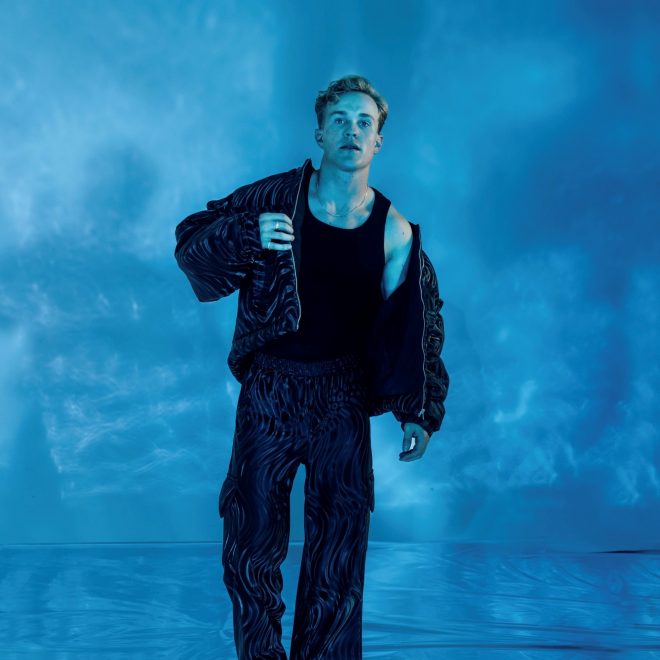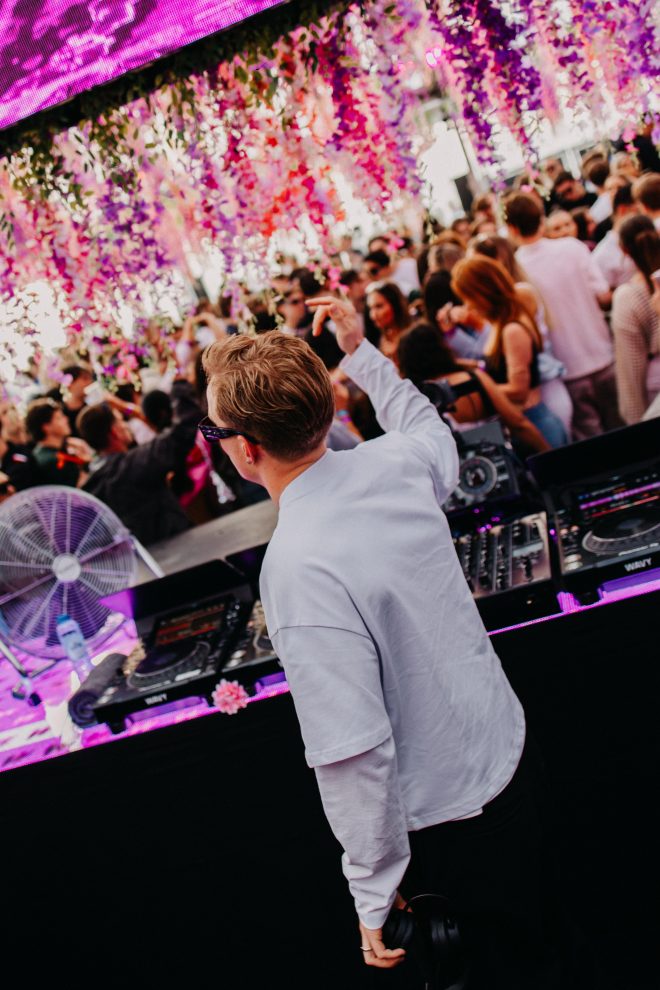Rooléh: “I want to make music that still feels fresh ten years from now”

Over the past few years, Amsterdam has become a breeding ground for producers who push house music into fresh and unexpected territories. Among the most promising of this new wave is Rooléh, a young artist whose tracks balance hypnotic groove with warm, sample-rich textures that feel equal parts body and memory. With a new release on Solid Grooves and growing support from names like Dennis Cruz and the No Art crew, his sound is finding resonance on both primary stages and underground dance floors alike.
But behind the momentum is a story that challenges the illusion of overnight success. Rooléh’s path has been methodical, shaped by weekly studio discipline, formative mentorships, and a deep understanding of how music is experienced, not just heard. His early love for hip-hop, techno, and cinematic storytelling now informs a distinctive loop-based approach, where samples from around the world are transformed into something that feels both timeless and contemporary.
As his career moves from the bedroom to the big room, Rooléh remains grounded. Whether producing or DJing, he’s less interested in chasing trends than in building sonic spaces where tension, release, and emotion unfold naturally. In this exclusive conversation with Mixmag NL, we dive into the creative process, pivotal lessons, and personal philosophies of one of Amsterdam’s most intriguing new voices.
Your recent release on Solid Grooves marks a milestone that many emerging artists dream of. Beyond the prominent recognition, what did this release emotionally signify for you? Was there a moment in the process, either making the track or hearing it played out, that affirmed your place in the scene or challenged you to redefine what success means?
I was conducting a one-on-one session, demonstrating how I build a track from scratch. Impulse began as a simple demo to illustrate the process. But then I found this saxophone hook and, when I played it before the drop, I had to pause. This might become something big. Still, you constantly second-guess; what will others think? So I sent it to Dennis Cruz immediately. “BOMB,” within a minute, and said he was going to play it at the No Art Festival that week.
Seeing the track played on the main stage and watching the entire crowd with their hands in the air… that was the moment I realized I had reached a new level.
You started producing in 2020, and within a year, you were being mentored by some of the Dutch scene’s most respected figures. Looking back, what inner qualities, beyond talent, do you think allowed you to accelerate your path? Were there moments of doubt or internal pressure, and how did you stay creatively grounded?
I asked Chris Stussy during a 2020 session how long he thought it would take to “make it.” He said, “Five years.” And now, here we are, exactly five years later, talking about my first real breakthrough. It didn’t feel like acceleration. It was a consistent grind: weekly studio sessions, managing my social media, and staying organized. I think that reliability helped me stand out. I’ve always enjoyed documenting my activities, creating aftermovies of vacations, and the like, so being active and open on camera came naturally. And honestly, in this industry, being on time and easy to work with can be just as important as the music. That’s one reason I was selected for the Master's NL project.
Masters NL wasn’t just mentorship. It was a moment of artistic transformation. Can you describe a key moment or lesson from that time that fundamentally shifted how you approach music?
At the time, I was still studying to become a PE teacher, so I rarely had whole days to focus on music. But for the program, I got an entire month off to produce. I went all in, with 12-hour studio days every day, and quickly realized it doesn’t work like that. I drove myself crazy and had to learn to find balance: shorter sessions, taking breaks, and incorporating workouts. One huge lesson from Michel de Hey was about how music is experienced differently on a dancefloor versus at home. For instance, in a club, when the drums drop out, people stop dancing unless there’s a massive synth or vocal holding it down. So, I learned to keep subtle drums playing in breaks to keep the energy flowing. Another key lesson was around sampling. Instead of using big-name tracks like those of Rihanna or Missy Elliott, I began digging for obscure sources and transforming them into something original. That’s when my style evolved.
You’ve gone from bedroom producer to being played by global selectors in just a few years. How has your idea of “making it” changed along the way?
It clicked for me when Impulse got played by Dennis Cruz at No Art Festival. Seeing not just the crowd, but the whole No Art crew, ANOTR, Dennis, vibing to my track, that was different. It wasn’t just a personal win; it felt like acceptance into a community I respect. After that, bookings came in from Sona’s events, such as Wavy, Botaniq, and No Art itself. Before that, I was happy just getting signed anywhere. Now, I’m more intentional about where my music lands. Solid Grooves set a new bar for me.

Your sound sits at the intersection of groove and memory. It feels physical, but also oddly nostalgic. Where does that tension come from? Are there personal or cultural roots behind it?
I’ve always been drawn to repetition. I grew up listening to old-school hip-hop, tracks that loop a sample endlessly. At 18, I discovered Jeff Mills, especially his track "The Alarms," which still feels incredibly relevant to my sound today. Later, I found ANOTR, Toman, and eventually the Cécille Records vibe, which people now refer to as “loop house.” That’s when I realized I had found the exact sound I’d been chasing. Now, when I produce, I focus on crafting a hypnotic loop, something you could listen to for hours. Then I add uplifting touches to create movement and energy, and that’s it. Simple, but powerful.
You’re part of a generation reshaping what “house music” means, blending afro, funk, disco, and beyond. How intentional is that genre-crossing for you? Do you feel part of a broader cultural shift?
Honestly, it’s very instinctual. I get bored easily, so I cycle through genres when digging for samples. Currently, I’m into Afrobeat; previously, it was funk, disco, and hip-hop. I go where the inspiration takes me. But I do think there’s a bigger picture. We’re in a moment where sampling is becoming a form of storytelling. It’s about breathing new life into sounds that might’ve been forgotten, or never heard in this context. It connects people, even if they don’t know why.
When you’re behind the decks, what’s your role in the room? Are you leading, holding space, reflecting energy?
DJing is a lot like producing. You need tension and release. If it’s just banger after banger, the crowd burns out. I like to build, create anticipation, let the room breathe. And when I feel they’re ready, I’ll hit them with something powerful. It’s about patience and awareness, reading the crowd while staying true to the journey I want to take them on.
With the momentum you’ve built and the respect you’ve earned, you’re standing at the edge of a bigger stage. What kind of legacy do you hope to leave behind?
I want to create music that remains fresh ten or twenty years from now. Just like how I still listen to 'The Alarms' from Jeff Mills, made nearly three decades ago, and it feels like it could’ve dropped yesterday. I hope people look back at this moment in my career and hear an artist exploring global sounds through the lens of loop house. Something that resonates, no matter where or when they listen to it.
Rooléh’s journey is only beginning, but it’s already built on something solid: not just grooves, but grit; not just loops, but lasting impressions.
Rooléh represents a refreshing evolution within the house music landscape, an artist who values depth over spectacle and longevity over hype. His productions are rooted in a loop-driven philosophy that pays homage to both old-school hip-hop and the hypnotic minimalism of artists like Jeff Mills. Yet what sets him apart is the emotional intelligence behind his work. Each track feels meticulously built for the dancefloor but laced with a quiet nostalgia that gives it life beyond the club. With his recent release on Solid Grooves and consistent support from key figures in the Dutch and international scenes, Rooléh is proving that a patient, well-crafted approach still resonates in a fast-paced musical world.
He’s an artist deeply aware of how sound moves bodies and connects people, whether through subtle Afrobeat samples, funk-inspired rhythms, or perfectly timed breaks. He’s not chasing trends; he’s building something timeless. In an era dominated by quick drops and disposable tracks, Rooléh’s work reminds us that groove is a language, and when spoken with intention, it echoes far beyond the night it was played.


